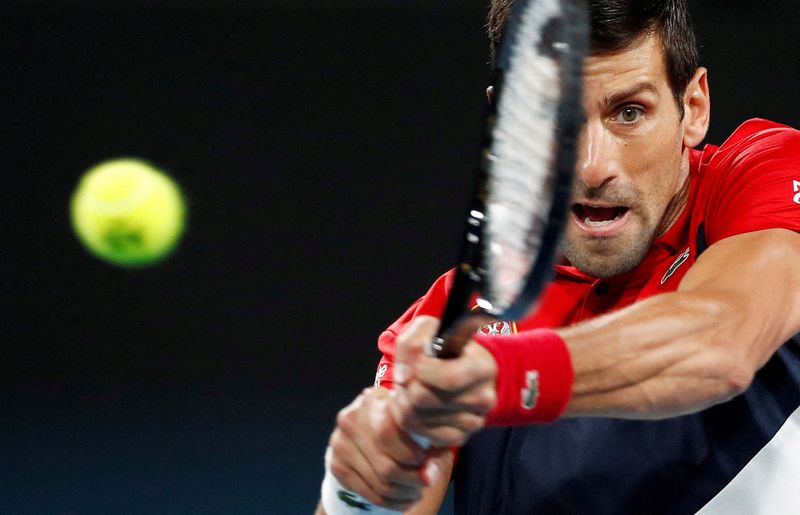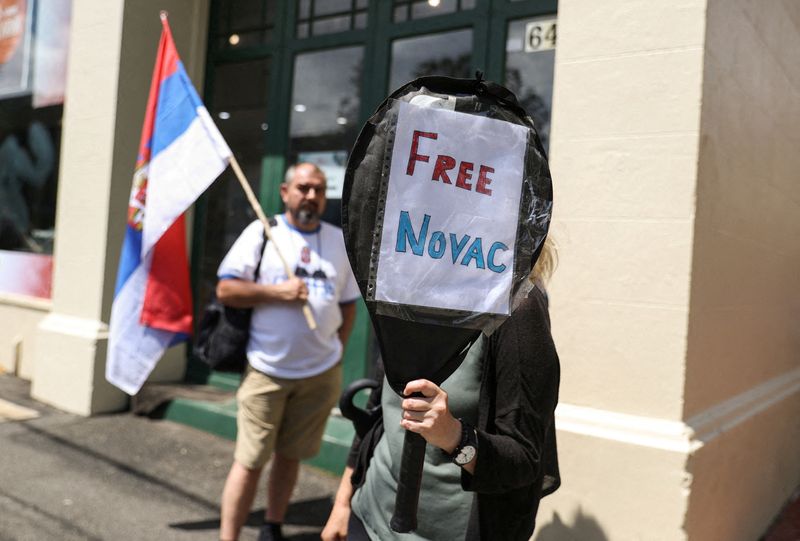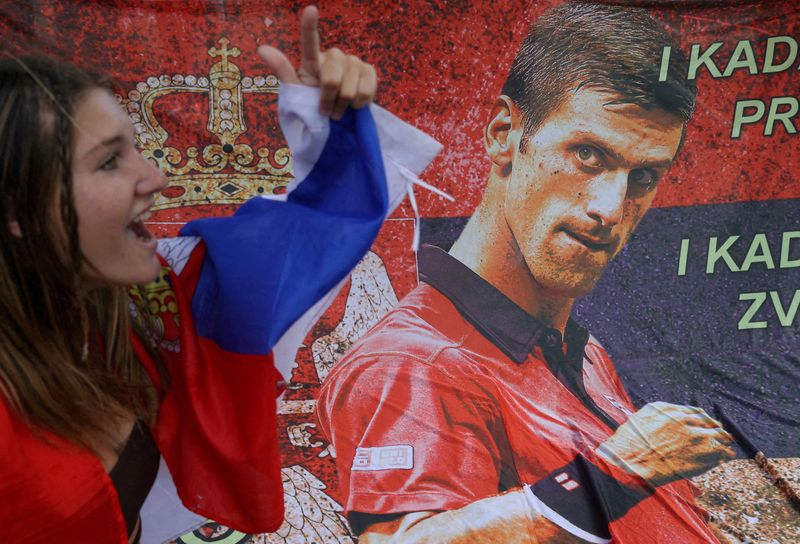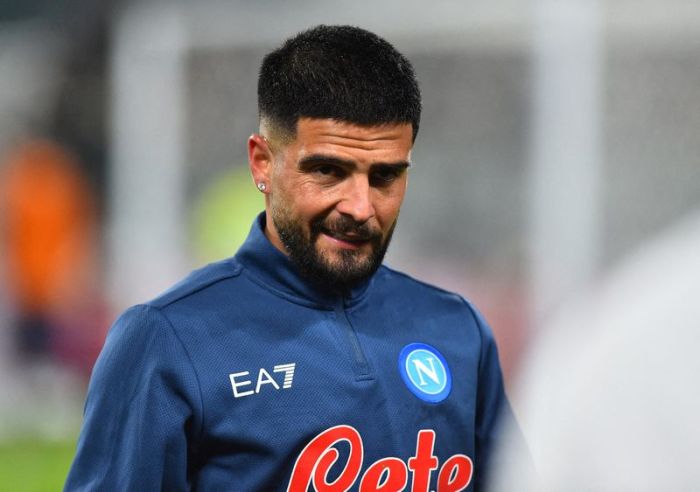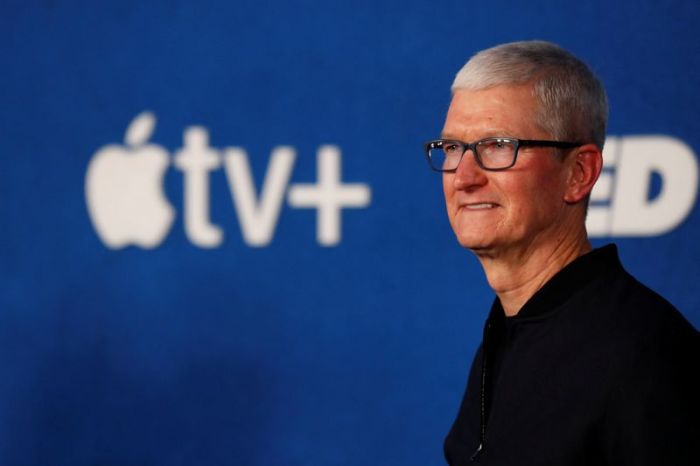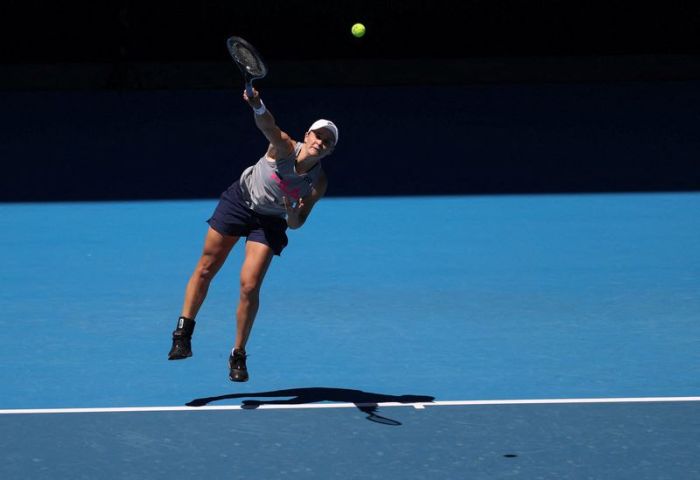MELBOURNE (Reuters) – Tennis world number one Novak Djokovic said in a legal challenge on Saturday to being refused entry to Australia that he had been given medical exemption from vaccination against COVID-19 because he had contracted the illness last month.
In a court filing ahead of a hearing on Monday over his visa cancellation Djokovic said he had received the exemption from tournament organiser Tennis Australia, with a follow-up letter from the Department of Home Affairs saying he was allowed into the country.
The Serbian player, hoping to win his 21st Grand Slam at the Australian Open later this month, is on his third day in immigration detention in Melbourne – a case that has caused a sporting, political and diplomatic furore.
A vocal opponent of vaccine mandates, Djokovic has been confined since Thursday in a modest hotel after his visa was cancelled due to problems with the medical exemption from the country’s immigration requirement for coronavirus vaccination that he presented.
The drama has caused tensions between Serbia and Australia and has also become a flashpoint for opponents of vaccine mandates around the world.
“I explained that I had been recently infected with COVID in December 2021 and on this basis I was entitled to a medical exemption in accordance with Australian Government rules and guidance,” Djokovic said in the filing about his experience being detained at Melbourne Airport.
Djokovic said he told Australian Border Force officers that “I had correctly made my Australian Travel Declaration and otherwise satisfied all necessary requirements in order to lawfully enter Australia on my visa”.
Djokovic had his first positive COVID-19 test on Dec. 16 but by Dec. 30 “had not had a fever or respiratory symptoms of COVID-19 in the last 72 hours”, the filing said.
On Jan. 1, it said, he received a document from Home Affairs telling him his responses indicated that he met “the requirements for a quarantine-free arrival into Australia”.
The federal court has ordered Home Affairs to file its response by Sunday.
The Border Force, a unit of Home Affairs, did not respond to a Reuters request for comment on Saturday.
The Australian Open starts on Jan. 17.
Many countries allow a recent COVID infection as a reason for an exemption from vaccine requirements. Australia’s federal government released a letter soon after Djokovic arrived showing that it had notified Tennis Australia that was not necessarily the case in the country.
The federal and Victorian state governments and Tennis Australia have denied responsibility for the dispute.
Meanwhile Czech player Renata Voracova, who was detained in the same detention hotel as Djokovic and had her visa revoked after issues with her exemption, left https://www.reuters.com/lifestyle/sports/tennis-player-voracova-left-australia-after-visa-issues-czech-foreign-ministry-2022-01-08 the country on Saturday, the Czech Foreign Ministry said.
The ministry said she left “based on her own decision to end her participation in the tournament due to complications with her visas” adding, “The decision was not based on her expulsion from the country”.
FOOD AND LAPTOP DELIVERED TO PLAYER
Djokovic’s court filing confirmed a media report that he had asked to be moved to lodgings with access to a tennis court but that his request was denied. The Park Hotel https://www.reuters.com/lifestyle/sports/visa-limbo-djokovic-housed-with-asylum-seekers-australian-hotel-2022-01-07, where he is staying, is also home to dozens of asylum seekers trying to enter the country.
Serbian Prime Minister Ana Brnabic said the player had been provided with gluten-free food, tools to exercise and a sim card.
“He’s staying in Park Hotel until the final decision is made,” Brnabic told Serbian media.
“We’ve managed to make sure gluten-free food is delivered to him, as well as exercising tools, a laptop and a sim card so that he is able to be in contact with his family.”
“It’s a positive tone from the Australian side. The Serbian government is ready to provide all the guarantees necessary for Novak to be allowed to enter Australia, the Serbian president (Aleksandar Vucic) is also involved,” Brnabic said.
The player’s family has been vocal in its support in recent days and his father, Srdjan Djokovic, said on Saturday he was “disgusted” at his son’s treatment in Australia.
“He feels the love, he is a mental rock. If the court decides that he must leave Australia, he will leave. If it decides that he can stay, he will stay. But politicians will not decide the fate of the world’s best athlete of all times,” he told a rally in front of parliament in Belgrade on Saturday, attended by a scattering of people.
‘SHOCK AND CONFUSION’
Djokovic’s filing said he had expressed “shock, “surprise” and “confusion” when he was held overnight, and had a bed prepared near his airport interview room so he could rest while waiting until the morning when he would be able to reach legal representatives and Tennis Australia, the filing says.
Customs officers ultimately “pressured” Djokovic to undertake an interview before he had spoken to either, the filing said.
Tennis Australia said it never knowingly misled players and had always urged players to be vaccinated, after News Corp papers published a document from the organising body apparently advising players on ways to enter the country with a medical exemption from vaccination.
“We reject completely that the playing group was knowingly misled,” Tennis Australia said in a statement quoted by local media.
Tennis Australia’s advice was based on the contents of a federal government website to which it had been referred by the federal health minister, the statement added.
Tennis Australia did not respond to Reuters requests for comment.
(Reporting by Courtney Walsh in Melbourne and Byron Kaye in Sydney; Additional reporting by Daria Sito-Sucic, Zoran Milosavljevic and Jason Hovet; Editing by William Mallard, Lincoln Feast and Frances Kerry)

